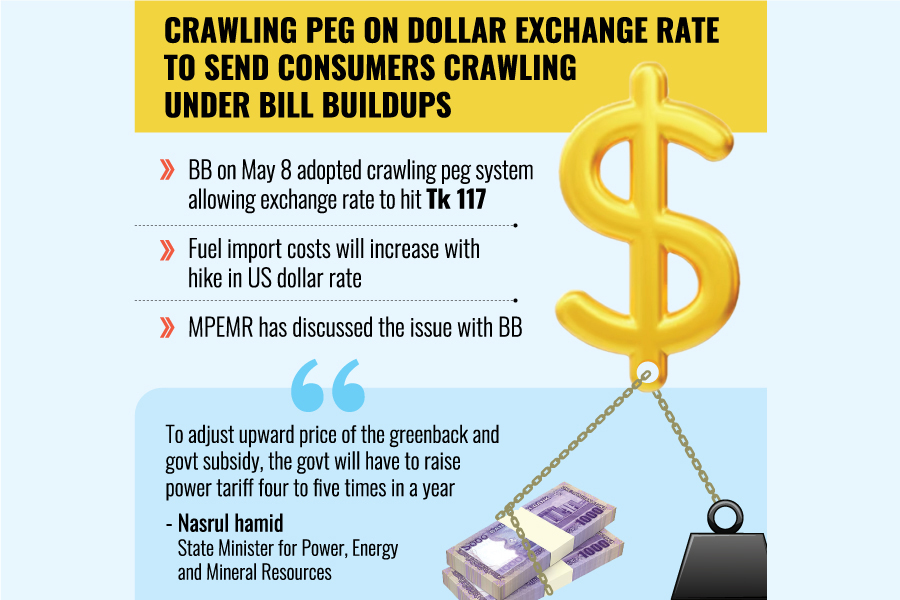
Published :
Updated :

Gas and power tariffs are poised for more frequent hikes than previously planned as a fallout from the bumped-up dollar pricing, sources say.
The exchange rate of the US currency has been pegged higher through the introduction of crawling-peg exchange rate by Bangladesh Bank (BB), under a reform recipe.
The central bank on May 8 fixed the crawling-peg rate allowing the country's commercial banks to buy and sell the greenback freely near Tk117 apiece.
The Ministry of Power, Energy and Mineral Resources (MPEMR) has already discussed the issue with the BB after the hike in the greenback rate by Tk 7, or 6.36 per cent, to Tk 117.
Import costs of petroleum products, coal, and liquefied natural gas (LNG) will increase with the raise in the dollar rate, market- insiders said.
"It will mount immense pressure," state minister for the Ministry of Power, Energy and Mineral Resources (MPEMR) Nasrul Hamid told newsmen.
To adjust with the elevated price of the greenback and government subsidy cutbacks the government will have to raise power tariffs four to five times a year, he said.
Previously, the MPEMR had shared its plan of raising power tariffs by up to four times, or on a quarterly basis, every year with the visiting delegation of the International Monetary Fund (IMF) in order to phase out government subsidy in three years.
"Bangladesh will see a significant surge in import costs of fuels, including oils, coal and LNG, with the hike in the dollar -exchange rate against Bangladeshi taka," says Shafiqul Alam, an energy finance analyst at the U.S.-based Institute for Energy Economics and Financial Analysis (IEEFA).
The government might raise tariffs of natural gas, electricity and oils for domestic consumers to offset the setback, he forecasts.
Sources have said the state-run Bangladesh Power Development Board (BPDB) owes around Tk 600 billion to different power-plant owners, including those of independent power producers (IPPs), rental power plants, Adani Power and imports from India most, until January.
The government pays fuel bills and capacity charges in US dollar to the power owners.
Another state-owned oil, gas and mineral corporation -- Petrobangla -- also owes around US$400 million to international oil companies -- including US's Chevron and Singapore's KrisEnergy -- and to LNG suppliers.
Bangladesh Petroleum Corporation (BPC) is separately struggling to pay around US$300 million to petroleum- product suppliers, market sources said.
The government in the latest hike raised the electricity tariffs by executive orders on February 29 for both retail and bulk consumers, with retrospective effect from February 1.
It raised retail electricity tariffs by around 8.50 per cent or by Taka 0.70 per unit (1 kilowatt-hour) on average, while the bulk tariff increased by 5.0 per cent, or by Taka 0.34 per unit, on average.
With the latest power-tariff hike, the new average retail price has increased to Tk 8.95 per unit from Tk 8.25 per unit and the new average bulk electricity price increased to Tk 7.04 per unit from Taka 6.70 per unit.
The least-volume power consumers are paying an additional Tk 0.28 per unit, while the highest consumers are paying an additional Tk 1.35 per unit.
The power tariff for retail consumers using more than 600 units rose to Tk 14.61 per unit from Tk 13.26 unit.
The tariff for the irrigation sector rose by Tk 0.43/unit.
In 2023, the government had raised electricity tariffs thrice at the retail level in three consecutive months-January, February and March-by around 5.0 per cent each to bridge the price gap between fuel costs and power prices.
The government at the latest raised gas tariffs for power generation by another executive order on April 30 by Tk 0.75 per cubic metre with effect from May 1.
Price of gas supplied to the government, privately owned IPPs and rental power plants rose to Tk 15.50 per cubic metre from Tk 14.75 and price of gas supplied to industrial gas-based power plants (captive) rose to Tk 31.50 per cubic metre from Tl 30.75.
Previously, the government also had hiked natural-gas tariffs by up to 178.88 per cent for different consumers including industries and power plants in February 2023 to foot the mounting LNG purchase costs.
The government has been adjusting domestic fuel prices every month since March in line with automatic fuel-pricing formula under a recommendation from the IMF.
Sources have said the Finance Division under the Ministry of Finance (MoF) has so far provided Tk 57 billion to the BPDB only in the current fiscal year (2023-24) as subsidy to facilitate electricity purchase from power producers.
Outstanding subsidy requirement of the BPDB as of June 2023 stands around Tk 98.30 billion, which had soared to around Tk 256.54 billion until September in the past year, the official added.
Turning the country's power sector subsidy-free is one of the preconditions the multilateral donor agency -- the IMF -- has set in its lending package, said sources.
The IMF approved a $4.7-billion loan to Bangladesh on condition that the country continue to rein in heavy subsidies to the energy sector, the lion's share of which goes to the electricity sector, followed by natural gas.
Although Bangladesh has been raising domestic fuel and energy prices, the IMF has said, "In addition, bar further global price shocks, the Bangladesh authorities have committed not to increasing these subsidies during the programme and exploring options to gradually reduce them further, while scaling up social-protection schemes."
Azizjst@yahoo.com


 For all latest news, follow The Financial Express Google News channel.
For all latest news, follow The Financial Express Google News channel.